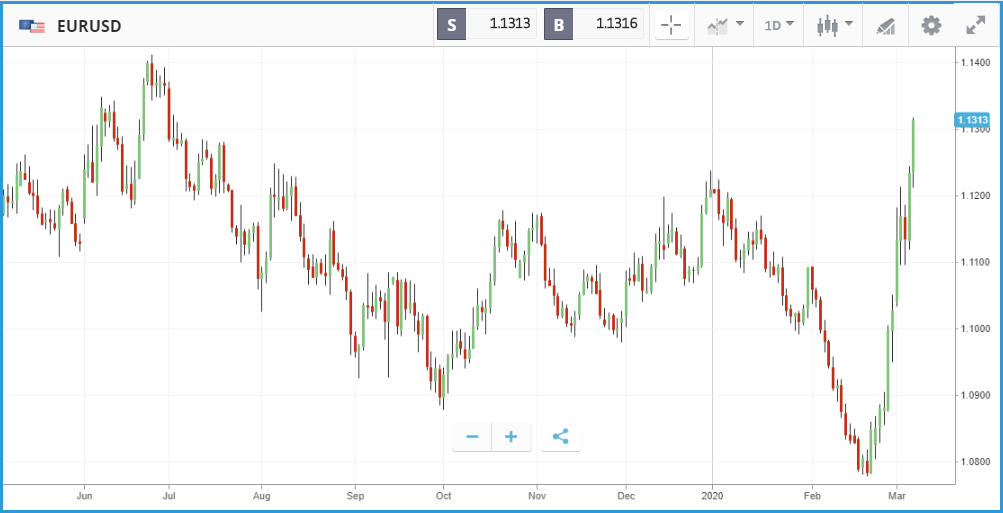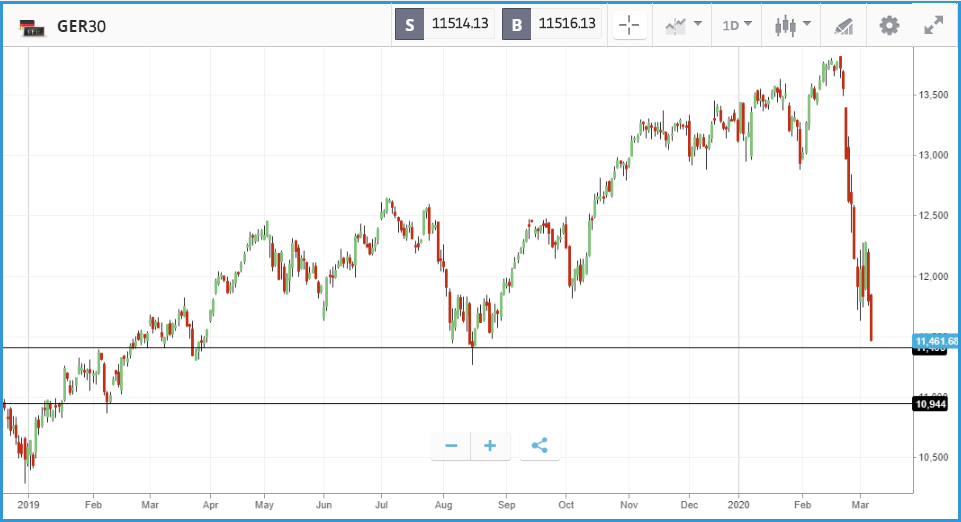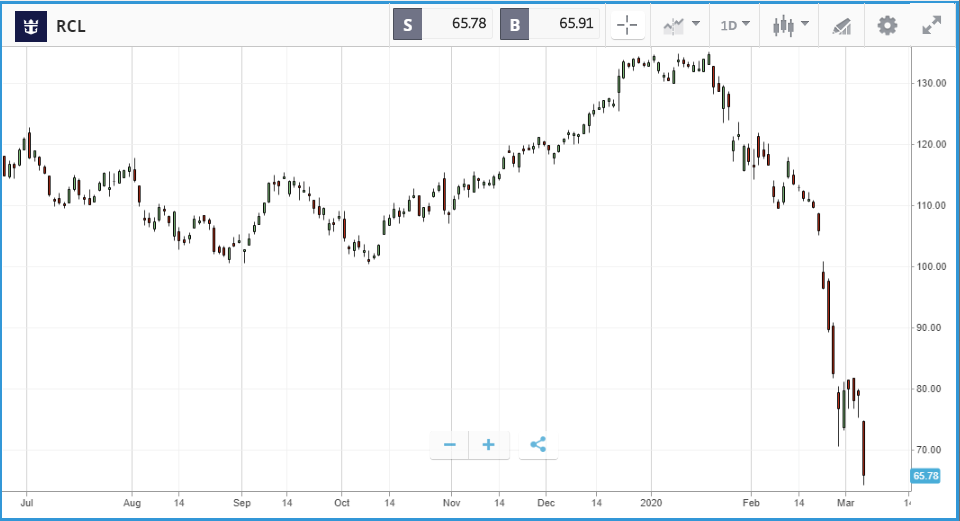Good morning everyone,
Selling pressure has continued this morning as fears grow of a global economic slowdown, 2-3% moves or greater have been the norm this week as the volatility index or VIX is at multi-year highs.
Despite monetary policy easing, investors are continuing to flee equities en masse, leading to speculation that the Federal Reserve may opt to cut interest rates again; we could potentially see a further 25bps cut at this month’s meeting on March 18th-19th. This has weakened the dollar, the euro has climbed from 3 year lows to reverse all its losses for the year now with a $1.13 handle, last seen back in July 2019. This rally also comes despite the expected 10bps interest rate cut from the ECB next week, which is widely priced into the market already. Unlike the Fed, the ECB did not previously raise rates when the economy improved and they now have a more limited scope for monetary policy easing.

A strong euro also puts extra pressure on the exporter-heavy German DAX, currently trading at a 4% loss for the day. The index is currently on its way to challenging August 2019 lows around the 11,400 mark and a continued decline towards 11,000 would see the DAX the lowest it has been in 12 months.
Almost 17% has been wiped off the German stock market in just over two weeks, the index includes many household names, for example Adidas and BMW. It will be interesting to see at what point these kinds of stocks become discounted enough for investors to jump back in.

Thursday roundup
Yesterday, the major US indices sank more than 3% and the yield on US 10-year Treasuries fell to a record intraday low of 0.86%. At the same time, the price of gold jumped again to a peak of $1,686 an ounce and has now gained more than 5% over the past seven days. The fear factor driving all of these movements is the continued spread of the coronavirus epidemic, with New York’s cases doubling, Seattle’s total hitting 70 and the first cases announced in San Francisco. President Trump’s bizarre handling of the situation publicly has stirred concerns about the administration’s response to the virus. On Wednesday night, he claimed that the World Health Organization’s death rate data is false, citing a “hunch”, and he has repeatedly attempted to play down the potential for the virus to spread and hurt the US economy. Late on Thursday, he admitted that the epidemic might impact the US economy, and Vice President Mike Pence – who is in charge of the response – said that the US does not have enough testing kits.
Cruise lines sink double-digits
The Dow Jones Industrial Average was the hardest hit of the three main indices on Thursday, falling 3.6%, with pharmacy chain Walgreens Boots Alliance the only firm to turn in a positive day. In the S&P 500, cruise firms, airlines and casino operators accounted for the seven worst performing stocks of the day. Royal Caribbean Cruises fell hardest, closing 16.3% down, taking its loss over the past month beyond 40%. It was reported on Thursday that vice chairman Adam Goldstein has left the company. Rival Carnival ended 14.1% down, with one of its cruise ships being held off the coast of California with 3,500 people on board after it became apparent a man who died of coronavirus had previously traveled on the ship.
Banking giants JPMorgan and Goldman Sachs also fell hard on Thursday, closing 4.9% and 4.8% lower respectively. In late evening news after market close on Thursday, it was reported that JPMorgan CEO Jamie Dimon has undergone emergency heart surgery, with America’s biggest bank being run by co-presidents Daniel Pinto and Gordon Smith during his recovery. Dimon saw JPMorgan through the financial crisis and has repeatedly made it clear he is not in a rush to vacate the position, but the surgery will ignite rumours about potential replacements.

S&P 500: -3.4% Thursday, -6.4% YTD
Dow Jones Industrial Average: -3.6% Thursday, -8.5% YTD
Nasdaq Composite: -3.1% Thursday, -2.6% YTD
London firms send staff home
London-listed stocks also slipped on Thursday, after the first UK death from COVID-19 was confirmed and the number of cases hit 116. More than 18,000 people have been tested. HSBC made the decision to send 100 members of its research department home after one of its employees tested positive for coronavirus, with nearby S&P Global sending all 1,200 employees in its 20 Canada Square office home. Amid the coronavirus epidemic, the FTSE 100 closed 1.6% lower, with the FTSE 250 ending the day 2.1% down.
Insurer Admiral Group was the best performer in the FTSE 100, climbing 2.6% after announcing double digit pre-tax profit growth, while airlines and miners weighed on the index at the bottom end. We highlighted ITV yesterday, which was the biggest loser in the index on Thursday, down 12% after warning it expects advertising revenue to decline due to travel firms pushing back ads in response to the coronavirus. In the FTSE 250, outsourcing firm Capita plummeted 38% after announcing it would need to spend a huge amount to turnaround its business, and said it was looking at selling off non-core assets.
FTSE 100: -1.6% Thursday, -11.1% YTD
FTSE 250: -2.1% Thursday, -11.7% YTD
What to watch:
There are no significant companies reporting earnings today, but there are reams of data. The US announces employment for February, it is the last day of oil cartel OPEC’s meeting in Vienna, and six Federal bank presidents (Chicago, Cleveland, St. Louis, New York, Boston and Kansas) are presenting at the Shadow Open Market Committee in New York.
In Friday’s jobs report, economists are predicting the US economy added 175,000 new jobs in February versus 225,000 in January, with the unemployment rate holding at 3.6%. The report will be watched closely for the first signs of any knock-on effects from the coronavirus epidemic, but the data is based on a survey taken in the first half of the month, so it may be too early for anything significant to feed through. The leisure and hospitality sector, which makes up more than 10% of non-farm US employment, will be the category to watch given that it experiences the most direct feed through from travel disruptions and cancellations. Furthermore, February Manufacturing and Services PMI numbers were a big disappointment and this could have an impact on job numbers. January numbers were strong and it’s hard to see February getting anywhere near this all things considered, in that regard the consensus figure seems a bit high. It could even be possible we see a downward revision to January numbers also.
Meanwhile in Vienna, Saudi-led oil cartel Opec is currently meeting to negotiate cuts to oil output to sustain the price, which has fallen by around a quarter since the epidemic began. A meeting on Friday is scheduled to ratify a proposed deal to cut oil output by 1.5 million barrels a day, but there is uncertainty that the deal will make it to the finish line. The group now needs to get Russia on board. It is thought that Russia is willing to maintain existing cuts but is reluctant to agree to deeper reductions for Q2.
Crypto corner:
Bitcoin has held on to the $9,000 handle despite the sell off in equities. With central bank easing potentially shifting some investors into a ‘risk-on’ mode, the asset class of choice for some may well be crypto as stock markets continue to tumble.
We mentioned the Indian crypto ban being overturned yesterday, the Reserve Bank of India have announced that they will appeal this decision. The RBI is concerned that cryptocurrency presents a real risk to the current banking system, something that the Supreme Court said that they had failed to prove. Since the announcement, many Indian crypto exchanges have resumed fiat deposits.
All data, figures & charts are valid as of 06/03/2020. All trading carries risk. Only risk capital you can afford to lose.

